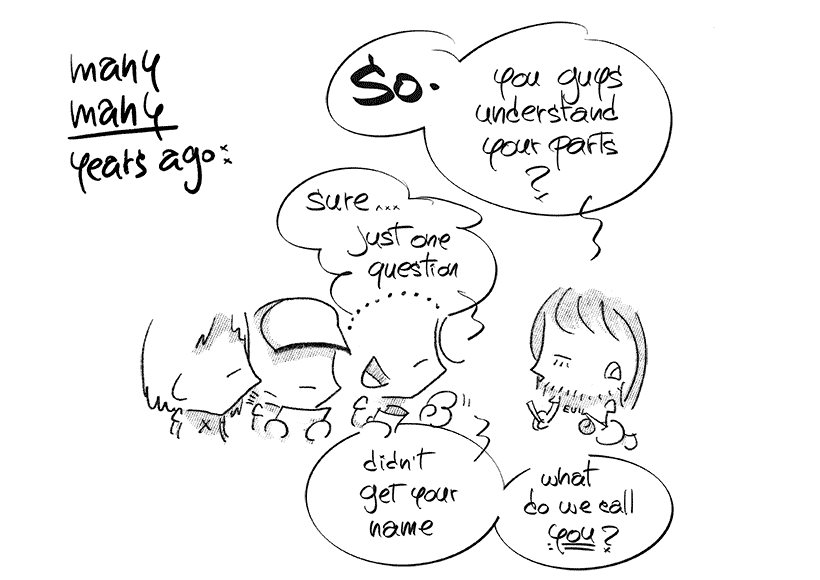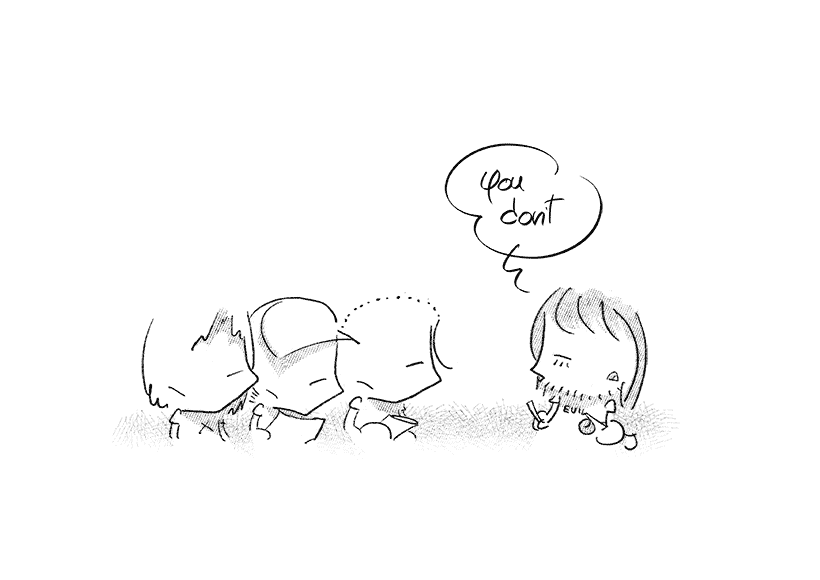say mah name
O nosso mashup ao mais recente do Comics Grid, "A Historical Approach to Webcomics: Digital Authorship in the Early 2000s" 7 jun 2019. Não partilhamos da orientação do artigo mas rasa perigosamente próximo de temas que nos são próximos: comix, digital, media, $$$ et autenticidade on tha punx-side:
Webcomics, as serial texts published by the same author over long periods of time, can teach us much about how developments in digital technology have shaped digital media over time.
in "A Historical Approach to Webcomics: Digital Authorship in the Early 2000s" 7 jun 2019
Das intenções, podemos fazer tese:
Available on the web and often excerpted by the visually-oriented algorithms of social media feeds, webcomics arguably have the broadest reach of any form of comics, yet they remain under-theorized.
This lack of scholarly attention to the form may exist in large part thanks to the diversity enabled by the lack of gatekeeping on the web, as well as the vast changes in webcomics creation, posting, and marketing that have developed as the form has evolved alongside digital technology. Given the close association with the development of the mode (digital technology) and the medium (webcomics) [...] webcomics ought to be studied alongside other digital media, approached not just as comics, [...] amidst [...] other elements, such as author social media accounts or the blog-like newsposts that some authors write to accompany a posted comic.
in "A Historical Approach to Webcomics: Digital Authorship in the Early 2000s" 7 jun 2019
...mas seguem outros caminhos que não nos importam:
This article applies a historically-focused approach to webcomics as digital media to demonstrate how the attention economy, where ‘eyeballs’ are a form of currency, recasts relationships between authors so they are characterized by cooperative competition via webcomics collectives.
in "A Historical Approach to Webcomics: Digital Authorship in the Early 2000s" 7 jun 2019
Mesmo se com as mesmas pistas. Blurbs à causa. i) Autoria:
in "A Historical Approach to Webcomics: Digital Authorship in the Early 2000s" 7 jun 2019
- Because of its origins, authorship is always bound up in questions of economics;
Traditional conceptions of romantic authorship: a category designed to promote the individual as part of a capitalist economic system.- On how the attention economy of the internet reframes traditional notions of authorship;
The attention economy of the internet encourages a different kind of relationship between authors than the competitive one seen in the material world of print.
ii) Economia da atenção:
in "A Historical Approach to Webcomics: Digital Authorship in the Early 2000s" 7 jun 2019
- Relationships in the attention economy of the digital realm differ from those in the economy of material goods: attention has been a key component of capitalism since at least the nineteenth century: the idea that successful cultural producers catch the attention of consumers drives approaches to marketing in the material world as it does in the digital world. However, in the digital world, attention becomes ‘the new scarcity,’ and this shift alters the relationship between consumers and producers.
... e agora combinados em iii) Economics of Readership and Authorship:
In most scholarship, writers and readers remain separate, with edited collections devoted to one or the other.
- Authorship is associated with notions of individual Romantic genius. Authors needed to assert control over their texts in order to make money from them, making the function of authorship an economic one. Even more recent conversations about authorship are concerned with authors ‘getting credit’ (to use an economic metaphor) for their work, asserting moral or legal rights over their productions.
- Studies of readers, by contrast, turn away from the author, focusing on how readers put the text to their own uses — how readers read works against the grain, often positioning readers in opposition to authors.
In both scholarship on authorship and scholarship on readership, readers and authors retain an antagonistic relationship to one another. For authors, there’s the sense that pandering to an audience compromises artistic integrity, while readers are frequently cast as underestimated or misunderstood by authors. Thus, scholarship enacts Barthes’s statement that the author must die in order for the reader to be reborn.
Despite previous separation of authors and readers, reading and writing on the internet are characterized by a blurring of the lines between these two forces as reading becomes a more interactive process.
in "A Historical Approach to Webcomics: Digital Authorship in the Early 2000s" 7 jun 2019
Essa mudança ocorre:
...from an industrial economy where [Axel Bruns]‘only industrial producers were directly involved in production processes, while audiences were cast in the role of consumers’, to a networked economy, where ‘the creation of shared content takes place in a networked, participatory environment which breaks down the boundaries between producers and consumers and instead enables all participants to be users as well as producers of information and knowledge—frequently in a hybrid role of produser where usage is necessarily productive’.
in "A Historical Approach to Webcomics: Digital Authorship in the Early 2000s" 7 jun 2019
Concluindo-se em conclusão que:
The blurring of boundaries between reader and author encouraged by this system of cooperative competition demonstrates how cooperative economic relationships were advantageous on the Internet in the early 2000s, suggesting that, even when still part of a capitalist system, competition is not the only way to succeed.
in "A Historical Approach to Webcomics: Digital Authorship in the Early 2000s" 7 jun 2019
Hélas, o artigo em si não nos serve a mais propósitos fora pequena gema enterrada que passará despercebida se não a enredamos em contextos próprios.
Anyone can produce content and usage often involves production, but in order to actually become public, authorship must garner attention. According to Foucault, lots of people may be writers, but only those identified by their names become authors.
in "A Historical Approach to Webcomics: Digital Authorship in the Early 2000s" 7 jun 2019



